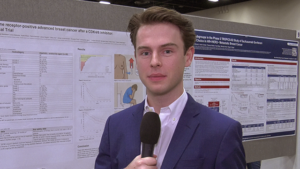Dr Luca Malorni, a medical oncologist and Director of the Translational Research Unit at the Hospital of Prato, Italy presented at SABCS 2023 the relation between serum thymidine kinase activity and the molecular features of tumour samples from the PYTHIA study
The PYTHIA trial, a phase 2 biomarker discovery trial, explored the potential of palbociclib and fulvestrant in patients with metastatic breast cancer resistant to endocrine therapy. As a downstream initiative of the Aurora Initiative from the Breast International Group, the trial involved a detailed molecular characterization of patients, incorporating biopsies from metastatic sites or primary tumors and liquid biopsies. The study spanned multiple countries, including Italy, Belgium, Switzerland, and France, under the International Breast Cancer Study Group.
Earlier publications highlighted the significance of the thymidine kinase biomarker in stratifying patient prognosis based on both baseline levels and dynamic changes during the initial month of treatment. The present research builds upon this foundation, introducing two additional translational studies associated with the PYTHIA trial. These investigations delve into the genomic and transcriptomic features of patients, exploring their correlations with prognosis and other biomarkers.
The genomic landscape analysis revealed diverse genetic backgrounds among the participants, with common alterations observed in genes such as P53, PI3K, and ESR1. Notably, P53 alterations were significantly associated with worse outcomes. The key finding from this poster is that, regardless of genetic background, the dynamics of thymidine kinase remained highly prognostic. Elevated thymidine kinase at baseline and the absence of thymidine kinase clearance at day 15 were linked to poorer prognoses, independent of mutational status.
This insightful addition to prior data emphasizes the prognostic value of thymidine kinase dynamics and underscores its potential as a biomarker. The study’s authors express anticipation for further validation in larger studies, paving the way for enhanced understanding and management of metastatic breast cancer.
Reference:
Malorni L. et al., Genomic and intrinsic subtype correlates of serum thymidine kinase activity in patients with metastatic breast cancer treated with palbociclib and fulvestrant in the PYTHIA trial- SABCS 2023, # PO3-13-02
You may also be interested in:
With the educational support of:
 |
 |
 |



